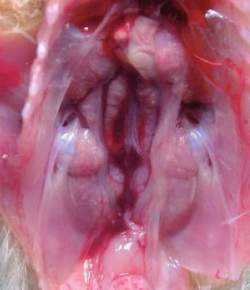The virus infectious bronchitis (IBV) is a highly contagious viral disease of chickens which is usually manifested as a respiratory condition. The evaluation of the immunological status, as well as the serological identification of IBV, requires the measurement of antibodies against IBV in serum. Enzyme-linked immunosorbent assay (ELISA) systems have demonstrated efficacy in quantifying levels of antibodies to IBV, and facilitate the monitoring of immune status in large flocks.

Generalities
Infectious bronchitis is an extremely contagious respiratory disease. It is produced by a virus that only affects chickens. It does not infect other poultry or laboratory animals. There are several strains of the virus. Infectious bronchitis is considered to be the most infectious of all poultry diseases . When it appears, all susceptible birds in the facility become infected, regardless of the sanitary or quarantine precautions that are taken. It can spread through the air and can “jump” considerable distances during an active outbreak. Also, it can be spread by mechanical means such as clothing, transport cagesand equipment. It is not transmitted through the egg and the virus probably cannot survive for more than 1 week in an unpopulated house. It is easily destroyed by heat and ordinary disinfectants. The infection is confined to the respiratory system . Some birds they may have a watery nasal discharge. The disease never causes nervous symptoms. Its prevalence in the flock is 10 to 14 days and if the symptoms last longer. In chickens less than 3 weeks old, mortality can reach 30 or 40%, but when they are more than 5 weeks old, mortality is no longer significant. Food consumption suddenly decreases and growth is retarded. When infectious bronchitis occurs in a flock of layers, production drops to almost zero within a few days and it takes more than 4 weeks for them to return to production. Some never recover an economic rate of production. Small, soft-shelled, irregularly shaped eggs are produced during an outbreak. It is difficult to differentiate bronchitis infectious disease of many other respiratory diseases, for this reason, a definitive diagnosis requires laboratory analysis.
Etiology
A coronavirus is the causative agent of this disease. The virus is present in respiratory and fecal discharges and in egg shells. Mainly attacks chickens
Symptoms
- Cough
- Sneezing
- Tracheal rales
- Dyspnoea
- Crying eyes
- Head swelling
- Interstitial nephritis
- Misshapen and thin-shelled eggs
Diagnosis
Symptoms in some cases appear similar to those of Newcastle disease and latingotracheitis, so it is recommended to isolate and identify the virus, ELISA test, serology, etc.
Treatment
There are numerous commercial vaccines, most representing a modified or selected strain of infectious bronchitis virus. The one used must contain viruses known to be present in the area.Fowl
All vaccines contain live viruses, and those that protect the best can also cause symptoms and decrease egg production. The vaccine virus will spread to other susceptible birds. The vaccine is added, in drinking water, as a nasal or eye drop, or in the form of a spray. There is no treatment for this disease. With young chickens it helps to increase the temperature of the brooder and provide conditions as close to optimal as possible.
- Antibiotic treatment only reduces mortality
- Administer attenuated vaccines, live vaccines, or killed virus vaccines as available
Precautionary measures
The disease is extremely contagious and does not always respect health barriers.
- Vaccinate chickens that you keep as layers.
- Whether it is necessary to vaccinate broilers depends on many factors and is an individual decision.
